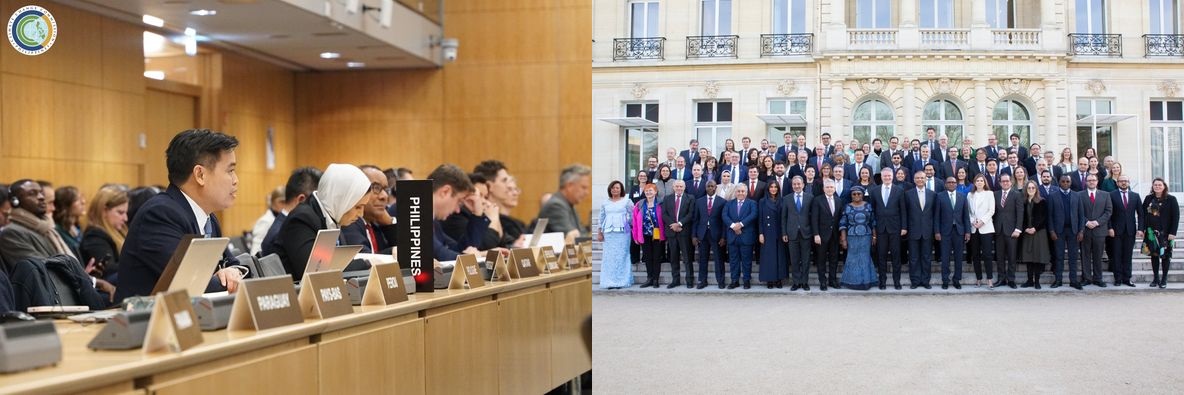
June 23, 2023 Friday

The Philippines participates in OECD’s Inclusive Forum on Carbon Mitigation Approaches meetings. (Left) CCC Secretary Robert E.A. Borje delivering an intervention during the inaugural meeting. (Right) Heads of delegations from 103 countries (Photo courtesy of OECD).
PARIS, FRANCE, 23 June 2023 — The Philippines was elected as co-chair of the Organisation for Economic Cooperation and Development (OECD)’s Inclusive Forum on Carbon Mitigation Approaches (IFCMA), an initiative to assess the impacts of national mitigation interventions on global greenhouse gas emissions.
The Philippines’ Climate Change Commission (CCC) Secretary Robert E.A. Borje will sit as co-chair, along with Switzerland’s Martin Baur and Chile’s Maria Jose Garcia. Serving as co-chair presents new opportunities to further strengthen international cooperation in climate action, between developing and developed nations.
The announcement was made during the first IFCMA Steering Group Meeting on 13 June 2023.
“The Philippines welcomes the OECD’s invitation to be part of the IFCMA, and election as Co-Chair. Under IFCMA, the Philippines will work to ensure that this will serve as a more focused venue for interaction among, and cooperation between countries, towards practicable and pragmatic partnerships to fast-track higher impact and cost-effective climate change mitigation actions,” said Secretary Borje.
The Philippines is the only middle-income nation among Asia-Pacific countries in the Steering Group (which includes Japan and Singapore), and to be elected co-chair.
“The Philippines is thankful for the vote of confidence and support. The election, we believe, demonstrates the continued and growing recognition of the Philippine Government under President Ferdinand R. Marcos, Jr.’s commitment and capability as a meaningful and constructive partner for transformative climate change action,” added Secretary Borje.
Earlier in February, the Philippines participated in the IFCMA inaugural meeting in Paris, France. IFCMA aims to assess national carbon mitigation approaches’ impact on global emissions – a project that will run from 2023 to 2025.
Secretary Borje was joined by Undersecretary Analiza Rebuelta-Teh of the Department of Environment and Natural Resources, and representatives from the Philippine Embassy in Paris, France.
During the meeting, the Philippines underscored that the development of a collective and inclusive strategy on global carbon emission reduction efforts is crucial, in response to the needed “deep, rapid and sustained emissions reduction” as emphasized by the Intergovernmental Panel on Climate Change.
Also aimed at enhancing international cooperation, the IFCMA will develop a global, comprehensive, and systematic stocktake of countries’ policies, programs, and projects on climate change mitigation, to undergo impact assessment on national and global emissions.
“The Philippines envisions IFCMA to be beneficial to all parties, particularly to developing nations most at risk and vulnerable; to establish enabling policy environment towards improved access to technology development and transfer, capacity building, and finance and investments as regards carbon mitigation approaches,” said Secretary Borje.
“This should be aligned with the existing work of international bodies such as the UN Framework Convention on Climate Change and its Paris Agreement, and consider data availability and applicability, and methodological gaps and challenges, particularly of the developing world,” he added.
The Philippines is one of the IFCMA’s Project Associates, and a pilot country candidate, expected to provide data on climate change mitigation-related policies, programs, and projects, and in turn, benefit and learn from a range of carbon mitigation approaches from various countries in different regions.
For more information on the CCC’s participation in global and regional climate action, and other mainstreaming activities, visit https://climate.gov.ph and www.facebook.com/CCCPhl.